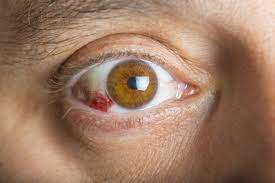Corneal Ulcer


What is Corneal Ulcer?
A corneal ulcer is an open sore that develops on the cornea, which is the clear, dome-shaped surface at the front of the eye. The cornea is responsible for focusing light onto the retina, which allows us to see clearly. When the cornea becomes damaged due to injury, infection, or other factors, it can result in an ulcer. This condition often causes significant discomfort, pain, and even vision loss if not addressed promptly.
Symptoms of Corneal Ulcer (Keratitis)
The symptoms of a corneal ulcer can vary in severity, but common signs to look out for include:
- Redness: The eye becomes noticeably red and inflamed.
- Pain: You may experience sharp, constant, or throbbing pain in the affected eye.
- Watering: Increased tear production is common in response to the irritation.
- Blurry Vision: Vision in the affected eye may become blurry or clouded.
- Discharge: The eye may discharge a yellow or greenish fluid.
- Burning: You may feel a burning or stinging sensation in your eye.
- Itching: The eye may feel itchy, especially if the ulcer is caused by an allergy.
- Light Sensitivity: Photophobia, or an increased sensitivity to light, is a common symptom.
Causes of Corneal Ulcer (Keratitis)
Corneal ulcers can be caused by a variety of factors, including:
- Contact Lenses: Improper contact lens use is one of the most common causes of corneal ulcers. Contaminated contact lens solution, poor hygiene, wearing lenses for extended periods, sleeping with lenses on, or using tap water or swimming while wearing lenses can all increase the risk.
- Trauma: Physical injury to the eye, such as chemical burns, thermal burns, scratches from animal tails, or plant matter, can damage the cornea and lead to ulcers.
- Post-Surgery: If you have undergone eye surgery and your corneal wound is not healing properly or if sutures are loose, it can increase the risk of developing a corneal ulcer.
- Lid Deformities: Conditions that affect the proper closure of the eyelids, such as in cases of Bell’s palsy or other facial nerve dysfunctions, can lead to corneal dryness and an increased risk of ulcers.
- Decreased Nerve Supply: Conditions like diabetes or Bell’s palsy that reduce the nerve supply to the cornea can make the eye more susceptible to ulcers due to decreased sensation and protection.
- Allergic Conjunctivitis: Allergies that cause inflammation in the eye can, in some cases, lead to corneal damage and ulcers.
- Vitamin A Deficiency: A lack of vitamin A in the body can impair corneal health, leading to dryness, irritation, and ulcers.
- Prolonged Use of Steroid Eye Drops: Long-term use of steroid eye drops can weaken the cornea and make it more vulnerable to ulcers.
- Severe Dry Eyes: Insufficient tear production can lead to dry eyes, which increases the risk of corneal damage and ulcer formation.
When Should You Book an Appointment with an Ophthalmologist?
If you are experiencing any of the following symptoms, it’s crucial to consult an ophthalmologist at Bajaj Eye Centre immediately:
- Decrease in Vision: If you notice a reduction in vision in the affected eye, seek professional care promptly.
- Redness and Foreign Body Sensation: Persistent redness or the sensation of something in your eye should not be ignored.
- Discharge: If your eye is producing abnormal discharge, it could indicate an infection that needs attention.
- White Spot Formation: A white or cloudy spot on the cornea can be a sign of an ulcer and requires immediate medical evaluation.
Treatment Options for Corneal Ulcers at Bajaj Eye Centre
At Bajaj Eye Centre, our experienced ophthalmologists offer personalized treatment options for corneal ulcers to help you recover swiftly and effectively. Treatment will depend on the underlying cause and the severity of the ulcer.
- Antibiotic Eye Drops: If the ulcer is caused by a bacterial infection, we will prescribe antibiotic eye drops to eliminate the infection and promote healing.
- Antiviral or Antifungal Treatment: In some cases, corneal ulcers are caused by viral or fungal infections. Our experts will tailor your treatment with antiviral or antifungal medications as required.
- Pain Management: Pain relief is essential for comfort during recovery. We may recommend pain-relieving eye drops or oral medications to reduce inflammation and discomfort.
- Steroid Use: In certain cases, steroid eye drops may be prescribed to reduce inflammation, but this is only done under strict supervision due to the potential for complications.
- Surgical Treatment: In severe cases, surgery may be required to repair the damaged cornea or to remove infected tissue.
- Prevention: We will guide you on the best practices for preventing further damage, such as proper contact lens hygiene, addressing eyelid issues, and managing underlying conditions like dry eyes or vitamin deficiencies.
Why Choose Bajaj Eye Centre for Corneal Ulcer Treatment?
- Expert Care: Our team of skilled ophthalmologists specializes in treating corneal ulcers with the latest techniques and technologies.
- Personalized Treatment: We provide individualized care tailored to your specific needs and the cause of your corneal ulcer.
- State-of-the-Art Facilities: Bajaj Eye Centre is equipped with the latest diagnostic and treatment equipment to ensure the best outcomes for your eye health.
- Patient-Centered Approach: We prioritize your comfort and well-being throughout your treatment journey.
If you’re experiencing any symptoms of a corneal ulcer, don’t wait for it to worsen. Book an appointment with us at Bajaj Eye Centre today for expert diagnosis and treatment of corneal ulcers. Let us help you restore your eye health and vision.
Get The Free Consultation
Useful Links
Get in Touch
Monday – Saturday
9 am – 7pm
Sunday – Closed
- +91-82959-12777
- 0180-2630777
- Bajaj Eye Centre, 206 New Sukhdev Nagar, Panipat
© 2025 Bajaj Eye Centre. All Rights Reserved – Designed by Fatewise.com

